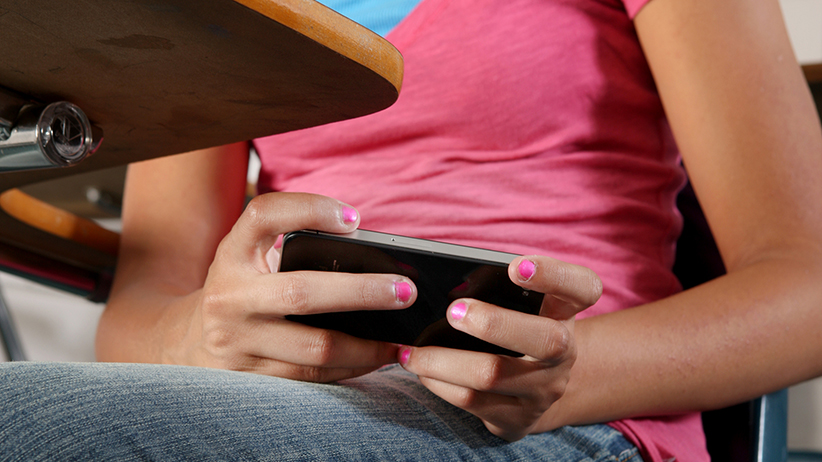Talking points: Of late-night texting and self-driving walks
Speed read the news with our Talking Points round-up, and sound like the smartest person in the room
Girl texting in class. Katrina Wittkamp/Getty Images
Share

Need an answer for that? Trying to look like the smartest person at the dinner party? Our Talking Points have you covered. Read our short takes on some of the big stories from the week that was:
1. Teenagers’ greatest fear: Technology?
It isn’t easy being a teenager. (Seriously.) A new study out of Rutgers University says late-night texting is hampering teens’ sleeping habits and affecting their grades. Another U.S. study has found that e-cigarettes, designed to help people quit smoking, may actually nudge teens toward tobacco instead. And in South Korea, Internet-addicted teens are being sent to rehab—without access to electronic devices for one month. “I feel like I’m being held captive,” one teenager said.
2. Any step toward Syrian peace could change lives.
At the very least, it’s a start. Hoping to broker a political settlement after nearly five years of civil war, the United Nations has invited Syria’s government and opposition forces to a negotiating session in Geneva. Although it is easy to point out the many potential pitfalls (including the fact that two of the most violent groups waging war, Islamic State and al-Qaeda affiliate al-Nusra Front, would never attend such peace talks), there is reason for cautious optimism. Even a temporary ceasefire—the first priority of the negotiations—would have huge implications, allowing aid organizations to deliver much-needed food and supplies to some of the hardest-hit regions.
3. Justice served for a cop who just kept shooting.
Under the glare of hindsight, it is always easy to second-guess somebody’s decision, especially a police officer’s. But in the case of Toronto Const. James Forcillo, his actions on the night of July 27, 2013, were simply inexcusable. It’s one thing to shoot a civilian in self-defence. It’s quite another to shoot that civilian three times, watch him collapse—then run closer to the body and fire six more bullets. Prosecutors presented a unique, somewhat complicated theory: that Forcillo was guilty of attempted murder in connection with the second volley of gunfire, because Sammy Yatim was already fatally wounded. The jury agreed with the Crown, and rightfully so. One way or another, a crime was committed.
4. Are Canada’s poor really getting poorer?
Assumptions aside, the number of Canadians stuck in continuous poverty is actually on the decline, according to an eye-opening new study released by the Fraser Institute. Between 2005 and 2010, only 1.5 per cent of Canadians were unable to escape a low-income financial situation, compared to 3.6 per cent between 1993 and 1998. Says the study: “The perception that there’s a large and growing portion of Canadians trapped in low income is not borne out by the data.”

5. Bottle or breast? Mother knows best.
For moms who have ever felt guilty about bottle-feeding, rest assured. The American College of Obstetricians and Gynecologists released new guidelines, directing health care professionals to support, not stigmatize, women who choose not to breastfeed. After years of ideological propaganda—“breast is best”—the guidelines are a welcome reminder that it’s mom who knows best when it comes to nourishing her child.
6. A step back for reconciliation.
The Canadian Human Rights Tribunal issued a damning judgment against the federal government, ruling that Ottawa has systematically discriminated against First Nations children by failing to provide the same level of child welfare services that exist elsewhere. A ruling nine years in the making, the tribunal found there was a financial incentive for the government to remove some children living on reserves and place them in foster care, even though that is not the standard of care in non-reserve communities. What’s most shocking, however, is that the Human Rights Tribunal had to tell the government what it no doubt already knew. Shameful.
7. How do Canadians react to a shaky economy? Hoarding.
How nervous are Canadians about the shaky world economy? Just count the dollar bills piling up in our bank accounts. According to a new report from CIBC Economics, Canadians are hoarding $75 billion in extra cash (up 11 per cent from last year) because they’re so spooked about market volatility. “We are currently witnessing the creation of personal cash buffers larger than at any other time on record,” said Benjamin Tal, who co-authored the report. “From a broader perspective, the Canadian economy is losing out because capital is not being allocated efficiently.” Could this be the start of a deflationary spiral? Let’s hope not. Fear is not a strategy.
8. The strollers make parents obsolete.
Would anyone seriously buy this device (even if it didn’t cost US$3,000)? Inspired by the advent of self-driving cars, a tech company is developing a hands-free baby stroller. Known as the “Smartbe,” it’s being marketed as “the first intelligent stroller in the world”—complete with smartphone charger, a bottle warmer and climate control. But if you’re taking your baby for a walk along a busy road, do you really want a stroller that pushes itself? Now, if the stroller changed diapers, we may be on to something.